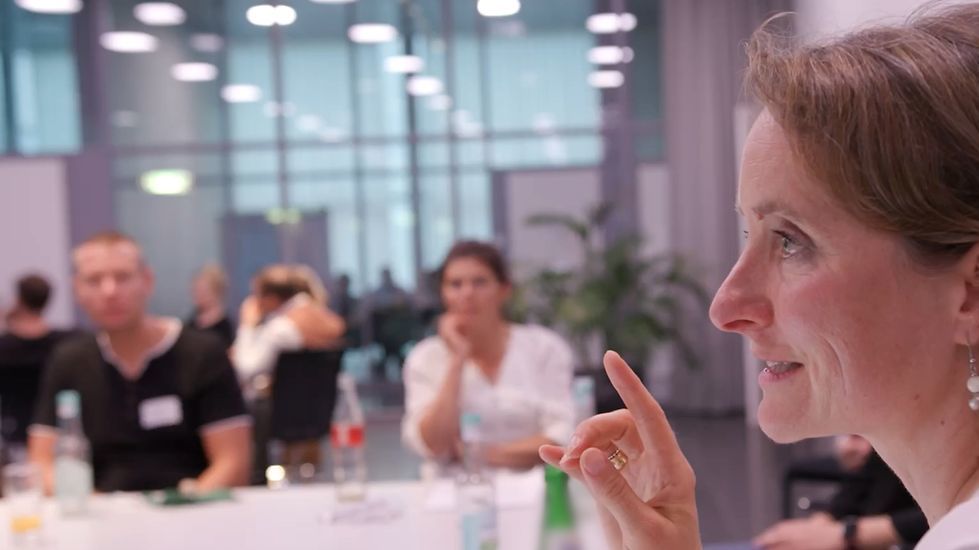Citizens' dialogue on national security

In developing a new national security strategy for Germany, the Federal Foreign Ministry has bet on the lot. In June and July 2022, citizens' dialogues were taking place in seven different cities throughout Germany with randomly selected people.
Of the workshops that took place for this purpose in Bremen, Görlitz, Gronau, Hof, Karlsruhe, Munich and Ravensburg, each had a different focus. The topics ranged from cyber security to the NATO security and defence alliance to climate and resource security, from democracy and human rights to the future of the German army.
Representation of the population
Each of the workshops was attended by 50 citizens. They were randomly selected from the population registers of the municipalities. The aim was to create as representative a small sample as possible of the entire population of the respective region or city. The aim was to take into account as many perspectives of citizens as possible so that the national security strategy reflects a broad social consensus.
In Bremen and Munich, the participants of the workshops had the opportunity to discuss their results with Foreign Minister Annalena Baerbock in front of a large audience. The small group work was followed by a large town hall meeting with the Foreign Minister.
"Everyday experts"
Most citizens asked about the domestic aspects of foreign policy, the things that have to do with their everyday lives. The Foreign Minister called the randomly selected citizens "experts of everyday life". Baerbock went from table to table at the workshop and answered the questions.
"I have a young son. Security also includes the climate. The 1.5 degree target is not realistic. How do you establish energy security?" asks a young woman participating. A young man asks about the gas crisis: the market for hydrogen has been bought dry, the expansion of renewable energies still needs years. How does the federal government want to get through the winter?
Experts take citizens' suggestions with them
Another question was how NATO's strategy of nuclear deterrence is compatible with the Nuclear Non-Proliferation Treaty. How do we deal with China? How will we ensure that even the poorest people in Germany will be able to heat their homes in winter if gas becomes scarce? In Karlsruhe, the topics included the possibility of reintroducing compulsory military service, how to deal with Syria and how to deal with racism.
The German army must be an attractive employer, say the workshop participants in Karlsruhe. It must reflect society and be well equipped digitally. The experts from the Foreign Ministry took these suggestions with them from the workshop. All the results of the citizens' dialogues will be incorporated into the National Security Strategy.
"Open Situation Room" method
On 11 August 2022, 50 of the 350 participants in the seven citizens' dialogues (7 - 8 from each city) came to Berlin. Here they met with experts from academia and foundations as well as diplomacy and politics in the Weltsaal of the Federal Foreign Office to discuss their findings in greater depth.
Using the so-called "Open Situation Room" method, concrete scenarios, such as a theoretical attack on an EU/Nato partner or a destabilisation in a developing country caused in part by climate change, were used to build up a high level of decision-making pressure in the individual working groups. Based on these scenarios, the participants discussed conceivable prevention approaches and were asked to weigh their political priorities against each other, find creative solutions and make often not easy decisions by group consensus. The participants, with their different experiences, knowledge and attitudes, came up with concrete proposals and options for action that will provide good orientation for the federal government in its further work on the new security strategy.
Lead responsibility at the Federal Foreign Office
The Federal Foreign Office was in charge of the security strategy, but all ministries were concerned with security are involved. The concept takes three dimensions into account: security against war and violence, strengthening democracy and the security of livelihoods. The new strategy was published on 14 June 2023.
The basic idea of the strategy is to take into account for the first time all internal and external threats to Germany's security - i.e. in addition to the military threat, also cyber attacks, possible attacks on critical infrastructure or even climate change. This is what the Federal Government calls integrated security policy in the strategy. In concrete terms, Germany commits itself, among other things, to meeting NATO's two-percent target for defence spending in the future or to building up food and energy reserves for emergencies.
Citizens' Assembly "Germany's Role in the World"
As early as 2021, randomly selected citizens gave thought to Germany's foreign and security policy within the framework of the Citizens' Assembly "Germany's Role in the World". The recommendations were handed over to the then Bundestag President Wolfgang Schäuble and representatives of the Bundestag parliamentary groups on 19 March 2021.
Read more: